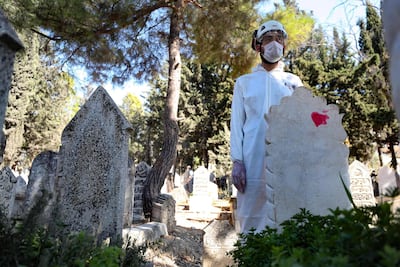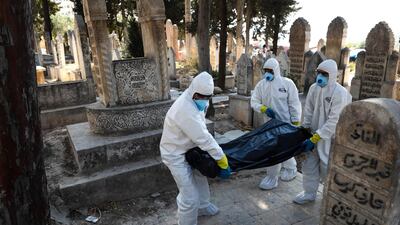Displacement camps in northern Syria are in desperate need of better sanitation and more testing centres as the "invisible enemy" of coronavirus spreads, threatening hundreds of thousands of people who already face dire living conditions.
According to Mohamad Hallaj, manager of the Syrian Response Co-ordination Group – humanitarian volunteers that mainly operate in Idlib and Aleppo – the number of cases across 20 camps in the area reached 51 at the weekend.
There are fears that figure could increase significantly with people living in tightly packed communities of tents, with shared washing facilities and toilets and only one PCR testing centre.
"The civilian infection rate in camps has reached 11 per cent of total infections in northern Syria," Mr Hallaj told The National.
Local and international humanitarian organisations must do more to provide more hygiene facilities for the camps, he said.
“There are 1,293 camps in northern Syria that house 1,043,000 people. Only 20 per cent are equipped with simple sewage systems – the rest are dependent on dirt holes," he said.
"A camp with 400 families may only have 10 bathrooms available for use."

Idlib is Syria's last rebel stronghold and suffered an aggressive offensive by regime forces this year that caused further displacement in a region already struggling to cope with the size of its migrant population.
On Monday, Russian jets carried out their heaviest air strikes on the province since a ceasefire was declared in March, stoking fears that another move to retake Idlib is on the horizon.
Syrians are facing a crashing economy worsened by US sanctions, bad living conditions in camps and almost a decade of war.
Dr Maram Al Sheikh, Minister of Health in the Syrian Interim Government – an alternative opposition government in Aleppo province – said the number of coronavirus cases in northern Syria has not yet reached its peak.
Idlib reported it first case in mid-July. On Monday, 26 new cases were recorded, bringing the total to 640 from 9,045 PCR tests, with six deaths also reported.
Those who died were mostly elderly and comprised three women, two men and an anaesthetist.
“The number of cases will gradually increase over the next few weeks,” said Dr Al Sheikh.
“We hope that the World Health Organisation and other will realise that we are on the verge of a real disaster, and be fully aware of the seriousness of the situation in northern Syria.”
There is only one device in Idlib to test for coronavirus and it can only carry out 200 tests a day, said Dr Al Sheikh.
___________________
Coronavirus across the region







____________________
The minister said reports indicated that citizens were not responding to the awareness campaigns and were not wearing masks or following other safety measures.
The Syrian Interim Government were unable to impose a curfew because of widespread poverty, which meant people needed to go to work, said Dr Al Sheikh.
However, civilians are increasingly concerned about the inability of officials and medical authorities to take preventive measures to limit the spread of the disease, especially with the lack of medical centres after regime bombing destroyed dozens of hospitals.
Said Abdulsalam Al Yousef, a father of eight who was displaced from the southern Idlib countryside by President Bashar Al Assad's forces this year, said he was worried about the spread of the Covid-19.
“My children have weak immune systems,” he said from Ahl Al Tah camp in northern Idlib.
“We are facing an invisible enemy and we will not be able to escape from it if it spreads in the camps.”
In another displacement camp, Abd Al Salam said the spread of the virus made the situation worse than it was before.
"I have taken all precautious measures to protect my family from the virus – I made masks from worn clothes, prevented my children from going to school and compensated them for that with distance education," he said.
Mr Al Salam said none of it was enough because tents in the camp were adjacent to each other and toilets, bathrooms and drinking water areas were shared by residents.

